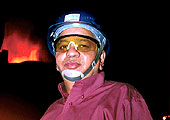 |
NAME:
B. MUTHURAMAN
AGE: 62
DESIGNATION: Managing
Director
COMPANY: Tata Steel |
He is the chief executive
of India's largest steel company and the world's fifth largest,
and he's hungry for more. On the anvil: a possible joint venture
with Nippon Steel Corporation of Japan, the world's second-largest
steel producer, for producing auto grade steel. And, he will become
CEO of what will probably be India's largest corporation once
the formalities of closing the Tata Steel-Corus deal are completed.
The graduate trainee, who joined Tata Steel straight from the
Indian Institute of Technology, Madras, in 1966, has come a long
way.
B. Muthuraman's climb to the top has been gradual. He spent
some time in the engineering and iron and steel-making side of
the company before moving to sales and marketing, where he has
spent most of his career, which has had its share of ups and downs.
In the early 90s, he had to steer the sales team through one of
the worst recessions faced by the Indian economy. Then, in the
late 90s, he spent a fruitless stint in Gopalpur, Orissa, trying
to set up a greenfield steel plant there. In between, he achieved
what till then was the high point of his career-the commissioning
of Tata Steel's Cold Rolling Mill in Jamshedpur ahead of schedule.
Under his leadership, Tata Steel has charted many new paths. Muthuraman
took the initiative of de-commoditising steel through branding
and retail initiatives; this reduced the company's dependence
on market conditions. He has shown foresight and agility to spot
and seize the opportunities of economic development by setting
up new capacities in steel making and moving into newer markets
spread across the globe-in South East Asia, the company bought
Nat Steel (Singapore) and Millennium Steel (Thailand); taking
Tata Steel's capacity to 7 million tonnes per year in 2004.
Muthuraman has always been a hands-on executive, though his
ability as team leader can be gauged from the way he steered his
team through the worst of recessions. Now, all that is history.
The acquisition of Corus has been a game changer for Tata Steel.
How he manages its transition from a national icon to global giant
will define his legacy.
-Amit Mukherjee
|





